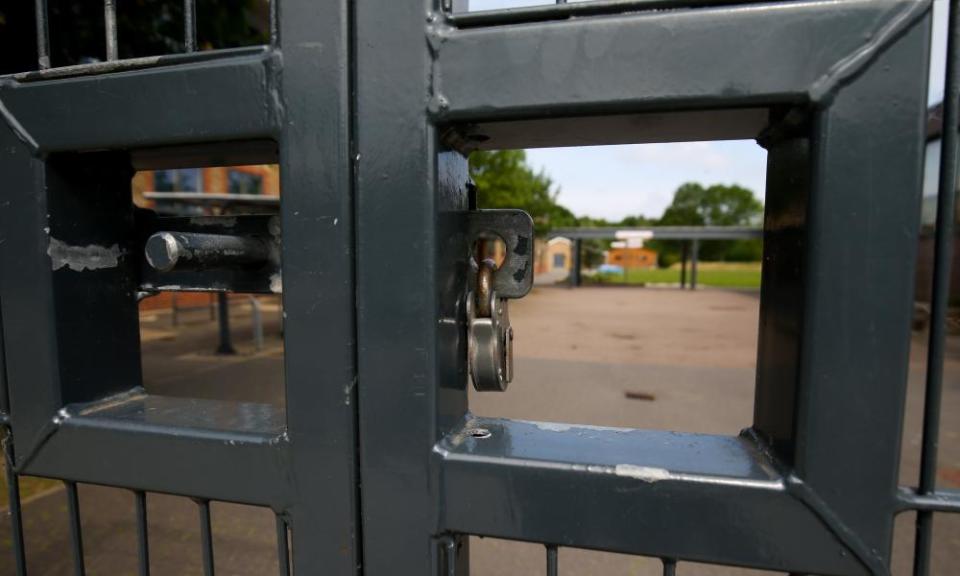School closures 'will trigger UK child mental health crisis'

Many schoolchildren will need urgent support from psychologists when the lockdown eases because their lives and education will have been so badly disrupted by school closures, experts have warned.
With state schools not expected to open fully until September at the earliest, educational psychologists advising the government say ministers will have to foot a huge bill for professional help for those in urgent need, and that the longer schools remain shut the worse the crisis will become.
Dr Gavin Morgan, who sits on the government’s Scientific Pandemic Influenza Group – which feeds into the advisory group Sage – said: “There is going to be a hell of a lot of work to be done from teachers and educational psychologists. We are going to have to pick up a lot of broken pieces and put things back together.”
Morgan, of University College London, made it clear that while the problems were likely to be more serious for those from underprivileged families, other children would also face adverse effects from missing their normal routines, their teachers, and playing with friends.
“One of the things that concerns me most is that for some children, school is one of the key focal points in their lives, giving them stability, meaning, self-worth, esteem. It is school that gives them a purpose.
“For some children, they are perhaps not getting that from home. What they get from schools is secure relationships and secure attachments and for some kids that is with their teacher. For psychologists that is vitally important.” But all would be affected by the disruption to the normal patterns of their lives and lack of social interaction with peer groups. “When children are not with each other, not with friends, they are not learning how to interact. Much of this is done in the playground,” he said.
His views were echoed by Prof Cathy Creswell, of the University of Oxford, who said a recent study of 10,000 families in the UK suggested primary school children were much more troubled by lockdown than secondary school pupils.
“Parents in our study reported significant increases in behavioural and emotional problems – tantrums and disobedience – for children aged four to 10 while for those aged 11 to 16, parents actually reported a decrease in these problems,” she said.
While teenagers were able to keep in contact with their peers, using phones and computers, most younger children were not. “These are not natural ways for younger children to interact and as a result they are left isolated and anxious,” she said.
Creswell said mental health services were expecting “a tsunami of referrals” when lockdown restrictions were lifted. “We need to provide support for these children and even if that comes at a cost, we should be aware that the longer-term cost to the country will be far greater if this issue is not addressed now.”
Prof Dame Til Wykes, of King’s College London, said the problems for schoolchildren were part of a national crisis that was affecting all age groups. “Figures released last week by the Office for National Statistics revealed that 19 million adults in Great Britain are suffering from high levels of anxiety,” she said. “A lot of people are going to experience intense mental health difficulties and will need specialist treatment.”
Wykes added that lack of certainty about the future was only worsening a very worrying situation: “People don’t know what to look forward to or how to act. Should they plan a holiday? Or wear a face mask? Or send their children to school? Currently most government plans end up in U-turns and that is making people even more anxious.”
On Friday, ministers responded to concerns of parents and MPs about the failure to reopen schools, by announcing a £1bn fund to help children catch up on what they have missed. Teachers and educationalists welcomed the extra money but said that what children most need is their own teachers who know their abilities and needs rather than new temporary “generic tutors”.
Boris Johnson is expected to announce a partial lifting of the 2-metre physical distancing rule, though Whitehall sources said the changes would not apply across the board. Unless the new rules apply to schools they will not affect the reopening plans. It is expected that the two-metre rule will be relaxed outdoors in areas such as pub and restaurant gardens, rather than indoors.
default
The Liberal Democrat MP Layla Moran will on Sunday highlight government figures showing the large number of primary schools which are already operating above capacity – making a return to the classroom even more difficult to achieve.
In the north west, the region with the highest death rate from coronavirus outside London, 636 primary schools were at or over capacity before the pandemic hit. In the West Midlands, 456 primary schools were already full or over capacity.
“These stark figures reveal that unless urgent action is taken, schools simply won’t have the space for pupils to return safely in September,” Moran is to say. “Urgent action is needed to increase school capacity, including using empty buildings in local communities.”
Writing in the Observer , Morgan argues that ministers should have been planning in detail for the re-opening of schools far earlier and should have worked harder to reassure parents and teachers that risks to children were limited from Covid-19.
A Department for Education spokesperson said: “We are working to get all pupils back in the classroom by September because we know being in school is vital for their education and wellbeing. The welfare of children and staff at the heart of all our decisions.
“We have placed significance on mental health in our planning framework for schools and launched a new training module to support schools to teach about wellbeing issues as part of the health curriculum as children go back.”

 Yahoo Sport
Yahoo Sport 





































